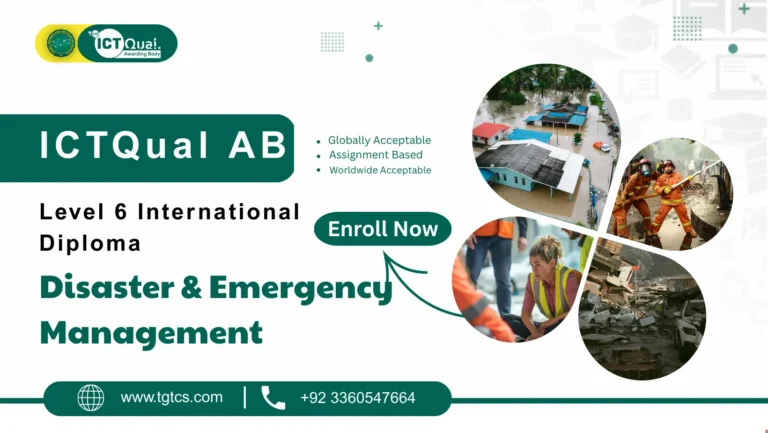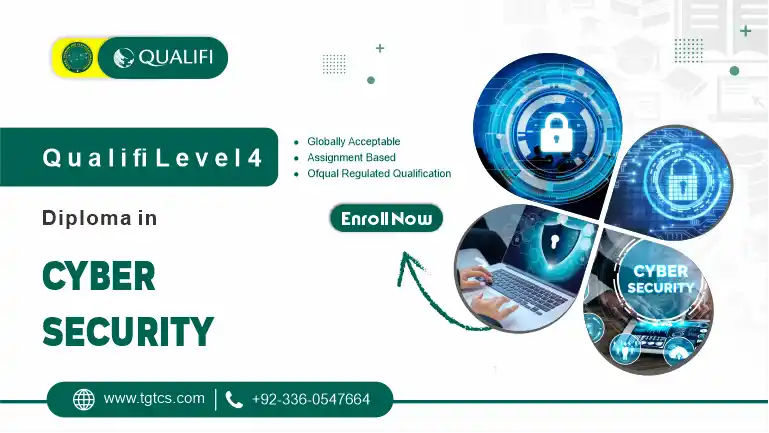ICTQual Level 4 Diploma in Civil Engineering 120 Credits – One Year
The ICTQual Level 4 Diploma in Civil Engineering offers an exceptional opportunity for those who want to deepen their technical expertise and enhance their qualifications in the field. This one-year program, awarded with 120 credits, is designed for individuals who already possess a foundational understanding of civil engineering concepts and are ready to move on to more complex areas.
The ICTQual Level 4 Diploma in Civil Engineering is a comprehensive qualification that covers both theoretical knowledge and practical skills. As a 120-credit program, it is ideal for individuals who want to develop their professional capabilities in civil engineering, preparing them for a wide range of career opportunities in the construction and infrastructure sectors.
The course provides a deep dive into key areas such as structural engineering, construction management, surveying, and environmental considerations. Upon successful completion, you will be equipped with the necessary skills to tackle advanced civil engineering projects, making you highly competitive in the job market.
The ICTQual Level 4 Diploma in Civil Engineering is the perfect qualification for individuals looking to kickstart or advance their careers in civil engineering. Whether you’re seeking to develop technical expertise, enhance your job prospects, or achieve professional certification, this diploma offers the knowledge and skills that are in demand across the industry.
The Global Training and Certification Services (TGTCS) is Directly Approved Training Centre of ICTQual
The ICTQual Level 4 Diploma in Civil Engineering is a one-year program designed to provide students with essential knowledge and practical skills in civil engineering. With 120 credits, this accredited qualification covers key areas such as structural analysis, construction materials, site management, and sustainable engineering practices.
Ideal for aspiring engineers or industry professionals looking to enhance their expertise, this diploma prepares graduates for roles in project management, site supervision, and structural design. The course is flexible and can be completed at an accelerated pace, offering excellent career prospects in the civil engineering field.
Mandatory Units
The Units of Level 4 Diploma in Civil Engineering 120 Credits – One Year are as ;
- Introduction to Civil Engineering
- Materials Science and Engineering
- Surveying Techniques and Equipment
- Structural Analysis and Design
- Geotechnical Engineering
- Construction Technology and Methods
- Environmental and Sustainability Issues in Civil Engineering
- Project Management in Civil Engineering
- Construction Safety and Risk Management
- Hydraulics and Water Engineering
- Transportation Engineering and Planning
- Civil Engineering Design Project
The following are the learning outcomes for each study unit in the ICTQual Level 4 Diploma in Civil Engineering:
- Introduction to Civil Engineering
- Understand the role of civil engineering in society and explore the various sectors within the industry.
- Identify key career paths in civil engineering and the essential skills required for success.
- Recognize the historical development and evolution of civil engineering practices.
- Materials Science and Engineering
- Analyze the properties of construction materials, including concrete, steel, and composites.
- Assess the suitability of materials for different civil engineering applications.
- Apply material testing techniques to ensure strength, durability, and reliability in construction projects.
- Surveying Techniques and Equipment
- Demonstrate proficiency in using surveying tools and techniques for measuring distances, angles, and elevations.
- Interpret and apply surveying data effectively for civil engineering projects.
- Understand the impact of modern surveying technologies on construction precision.
- Structural Analysis and Design
- Analyze forces, moments, and load distributions in various types of structures.
- Design basic structural elements like beams, columns, and foundations using appropriate engineering methods.
- Apply relevant structural design codes and standards to ensure safety and stability.
- Geotechnical Engineering
- Understand soil mechanics and the behavior of soil and rock in engineering contexts.
- Conduct soil tests and analyze the results for foundation design purposes.
- Apply geotechnical principles to assess ground conditions for construction projects.
- Construction Technology and Methods
- Identify and implement modern construction techniques and technologies in civil engineering.
- Understand the construction process, from site preparation and excavation to project completion.
- Evaluate the use of prefabrication, modular construction, and other innovative approaches in the industry.
- Environmental and Sustainability Issues in Civil Engineering
- Assess the environmental impact of civil engineering projects and propose sustainable alternatives.
- Integrate green building practices and eco-friendly materials in design and construction.
- Understand the importance of waste management and energy efficiency in civil engineering projects.
- Project Management in Civil Engineering
- Plan, organize, and manage civil engineering projects, including budgeting, scheduling, and resource allocation.
- Apply project management tools and techniques to monitor costs, timelines, and quality.
- Understand the roles and responsibilities of project managers in large-scale civil engineering projects.
- Construction Safety and Risk Management
- Identify safety hazards on construction sites and apply relevant safety regulations and protocols.
- Conduct risk assessments to mitigate potential dangers during construction.
- Understand the importance of health and safety management systems in ensuring a safe working environment.
- Hydraulics and Water Engineering
- Apply principles of fluid mechanics to design effective water supply and drainage systems.
- Analyze the behavior of fluids in engineering contexts, including flow rates and pressure.
- Design and assess flood control measures and water treatment systems.
- Transportation Engineering and Planning
- Understand the principles behind the design and planning of transportation infrastructure, such as roads, railways, and airports.
- Analyze traffic flow and apply transportation planning principles to enhance safety and efficiency.
- Evaluate the environmental and social impacts of transportation projects on communities and ecosystems.
- Civil Engineering Design Project
- Synthesize knowledge from multiple areas of civil engineering to create a practical civil engineering design project.
- Apply engineering analysis, design principles, and project management skills to develop a comprehensive project plan.
- Effectively present and communicate the design process, addressing challenges and solutions encountered during the project.
- Comprehensive Skill Development
The ICTQual Level 4 Diploma in Civil Engineering provides a well-rounded education, equipping students with both theoretical knowledge and practical skills. You’ll gain expertise in key areas such as structural analysis, materials science, geotechnical engineering, and project management, preparing you for a successful career in civil engineering. - Industry-Relevant Curriculum
The course is designed to meet the evolving demands of the civil engineering industry. With a focus on modern construction techniques, sustainability, and cutting-edge technologies, students will be ready to tackle real-world challenges and contribute to the success of engineering projects. - Quick and Flexible Learning
This one-year program, with 120 credits, allows students to fast-track their education and enter the workforce quickly. The course structure is designed to accommodate various learning styles, making it an ideal option for both full-time students and working professionals looking to enhance their qualifications. - Enhanced Career Opportunities
Completing the ICTQual Level 4 Diploma opens up a wide range of career opportunities in civil engineering. Graduates can pursue roles such as civil engineer, site manager, project coordinator, and structural designer, with the potential for further career advancement through additional qualifications. - Accredited and Recognized Qualification
The diploma is awarded by ICTQual, an accredited awarding body recognized within the civil engineering industry. This ensures that the qualification is highly regarded by employers and meets professional standards, offering credibility to your resume. - Practical Application and Hands-On Experience
Students will gain hands-on experience through practical assignments and a final design project. This allows you to apply what you’ve learned in real-world scenarios, strengthening your problem-solving abilities and preparing you for the complexities of engineering tasks. - Focus on Sustainability and Innovation
The course emphasizes sustainable engineering practices, teaching students how to incorporate eco-friendly materials, green building practices, and energy-efficient solutions into construction projects. This focus on sustainability is essential in today’s environmentally-conscious world. - Strong Industry Connections and Networking
Through the curriculum and guidance from experienced tutors, students have the chance to connect with professionals in the civil engineering field. These connections can open doors to internships, job placements, and mentorship opportunities, further enhancing your career prospects. - International Recognition
The ICTQual Level 4 Diploma in Civil Engineering is internationally recognized, providing graduates with the flexibility to work in civil engineering roles globally. This makes it an excellent choice for students who want to pursue opportunities abroad or with international companies. - Build a Strong Foundation for Further Education
The qualification provides a solid foundation for students looking to further their education in civil engineering. Graduates can progress to Level 5 or Level 6 qualifications, or even pursue professional certifications from respected bodies like the Institution of Civil Engineers (ICE).
By completing the ICTQual Level 4 Diploma in Civil Engineering, students will gain a valuable qualification that equips them with the knowledge, skills, and experience to thrive in the dynamic and rewarding civil engineering industry.
The ICTQual Level 4 Diploma in Civil Engineering is designed for a diverse range of learners who are motivated to build a successful career in civil engineering. The ideal learner for this course is:
- Aspiring Civil Engineers
If you are passionate about pursuing a career in civil engineering, this diploma will provide you with the essential knowledge and skills to kickstart your professional journey. You should have a strong interest in construction, infrastructure, and the role of engineering in shaping society. - Current Industry Professionals Seeking Advancement
Professionals already working in related fields, such as construction, architecture, or surveying, who want to deepen their understanding of civil engineering principles, methods, and technologies will benefit from this course. It offers a chance to upskill, specialize, and progress into more advanced roles within the industry. - School Leavers or Recent Graduates
This course is perfect for school leavers or recent graduates who have completed A-levels or vocational qualifications and are looking to pursue a career in civil engineering. The diploma provides a structured pathway to higher education or professional roles in the sector. - Practical Thinkers with Strong Problem-Solving Skills
Civil engineering requires a logical, analytical mindset and the ability to solve complex problems. The ideal learner will have an aptitude for mathematics, physics, and technical concepts, as well as an interest in finding practical solutions to real-world engineering challenges. - Individuals with a Keen Interest in Sustainability and Innovation
As civil engineering increasingly focuses on sustainability, the ideal learner will be interested in eco-friendly building practices, sustainable infrastructure, and the integration of green technologies into civil engineering projects. This course places a strong emphasis on environmental considerations and innovative solutions. - Goal-Oriented and Motivated Learners
The course is fast-paced and requires commitment, discipline, and a passion for learning. The ideal learner is motivated to complete the one-year program and take advantage of the career opportunities that come with gaining this accredited qualification. - Individuals Seeking International Career Opportunities
If you’re aiming to work in civil engineering roles globally, the ICTQual Level 4 Diploma is an excellent choice. The qualification is internationally recognized, making it ideal for those who wish to pursue engineering opportunities abroad or with multinational companies.
In summary, the ideal learner for the ICTQual Level 4 Diploma in Civil Engineering is someone who is committed, eager to learn, and passionate about contributing to the future of civil engineering. Whether you’re starting your career or looking to advance in the field, this course provides a strong foundation to help you succeed.
Progression Routes
Upon completing the ICTQual Level 4 Diploma in Civil Engineering, graduates have access to a variety of exciting career opportunities and further educational pathways. The knowledge and skills acquired during the program provide a strong foundation for career advancement in civil engineering, offering opportunities for specialization and higher-level qualifications. Below are some potential progressions for graduates:
1. Entry-Level Civil Engineering Careers
Graduates can begin their careers in a wide range of entry-level positions in civil engineering, including:
- Civil Engineer
- Structural Engineer
- Construction Site Manager
- Surveyor
- Geotechnical Engineer
These roles typically involve hands-on work in engineering projects, applying the concepts learned during the diploma to real-world situations. Graduates can work in various sectors such as construction, infrastructure, transportation, and environmental engineering.
2. Higher-Level Qualifications
Graduates of the Level 4 Diploma can choose to pursue further education by advancing to higher-level qualifications, such as:
- ICTQual Level 5 Diploma in Civil Engineering – A more advanced qualification that provides a deeper understanding of civil engineering principles, preparing students for managerial roles and senior technical positions.
3. Professional Certification
Graduates may also pursue professional certifications to enhance their career prospects and credibility in the field. These certifications, typically awarded by industry bodies, include:
- Chartered Engineer (CEng) – Achieving Chartered status through institutions like the Institution of Civil Engineers (ICE) is a significant milestone for civil engineers seeking professional recognition and career growth.
- Associate Membership of the Institution of Civil Engineers (ICE) – This is a valuable stepping stone toward becoming a Chartered Engineer and provides access to further professional development opportunities.
4. Specialization in Civil Engineering
Graduates can further specialize in specific areas of civil engineering, such as:
- Environmental Engineering – Focusing on sustainable construction practices, water management, and reducing environmental impact.
- Structural Engineering – Concentrating on the design, analysis, and construction of buildings, bridges, and other structures.
- Transportation Engineering – Specializing in the design and planning of roads, railways, airports, and traffic management systems.
- Geotechnical Engineering – Specializing in soil, rock, and ground conditions, essential for safe and stable foundation design.
5. Project Management and Leadership Roles
Graduates can take on leadership and management positions within civil engineering projects, including roles such as:
- Construction Project Manager
- Site Supervisor
- Contract Manager
These positions involve overseeing the planning, execution, and completion of engineering projects, ensuring they are delivered on time, within budget, and meet quality standards.
6. Entrepreneurship in Civil Engineering
For those with an entrepreneurial mindset, the Level 4 Diploma provides the technical knowledge and skills necessary to start a civil engineering-related business. Graduates can explore opportunities in construction, consulting, design, or environmental engineering services.
7. Further Study in Related Fields
Graduates may also opt to pursue further studies in related fields, such as:
- Urban Planning and Development
- Construction Management
- Sustainability and Environmental Management
These areas offer broader career opportunities, especially in managing large-scale infrastructure projects or focusing on sustainable urban development.
The ICTQual Level 4 Diploma in Civil Engineering offers a solid and flexible foundation for a wide range of career and educational paths. It equips graduates with the knowledge to enter the workforce quickly, pursue advanced studies, or specialize in areas of civil engineering that align with their interests and career aspirations.
Course Overview
Course Level
Level 4
Course Units
12 Mandatory Units
Duration
one year






